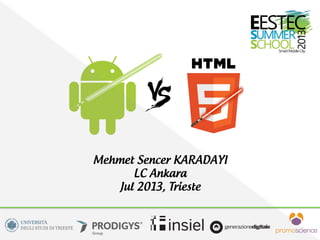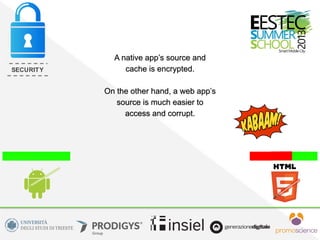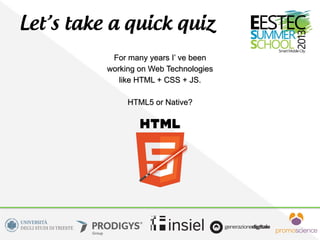Native VS HTML5
- 1. VS
- 3. âĒ The great app debate âĒ May the best app wins, the fight begins âĒ User Exprience âĒ Performance âĒ Monetization âĒ Security âĒ Cross-Platform costs âĒ Updates and Distribution âĒ And the winner isâĶ âĒ Quiz time âĒ Q&A
- 5. ââ A native mobile app is a smartphone application that is coded in a specific programming language, such as Objective C for iOS and Java for Android operating systems. Native mobile apps provide fast performance and a high degree of reliability. âĶ. ââ http://www.techopedia.com/definition/27568/native-mobile-app
- 7. A web- based program designed to run on any mobile device via a browser.
- 9. *according to Appcelerator/ IDCâs Q2 2012 survey %6Of the apps target as a Web App* 500kAndroid Apps in Google Play
- 11. USER EXPERIENCE Only native apps can deliver the best user expriences leveraging the full capabilities of the device and OS to offer innovative ways of doing things.
- 12. ââThe biggest mistake we made as a company was betting too much on HTML5 as opposed to native. It just wasnât ready.ââ â Mark Zuckerberg, Sep. 2012
- 14. ââOur view is that HTML5 technologies can deliver as-good- as-native experiences â and that will continue to be the focus for our core application, where weâll continue to improve our performance on all devices. And we were all extremely impressed by Senchaâs Fastbook which is a testament to the ability to deliver great experiences using web technology. But the lesson from Fastbook is that itâs hard work â you donât get those experiences out-of-the- box. And the lesson weâve learnt over the last 12 months has been that the cost in time, effort and testing to bring an HTML5 application to a native level of performance seems to be far greater than if the application was built with native technologies from the get-go.ââ
- 15. PERFORMANCE HTML5 still faces challenges in accessing device-native features across all mobile browsers, and in rendering graphically-rich user interfaces and data presentations.
- 16. MONETIZATION Google Play Store has 500k native apps, 15 billion downloads. On the other hand, Web apps have no Play Store-ish Marketplace except openappmkt.com
- 17. SECURITY A native appâs source and cache is encrypted. On the other hand, a web appâs source is much easier to access and corrupt.
- 18. CROSS-PLATFORM DEPLOYMENT COSTS Native apps require a new development and testing process for each platform. HTML5 was built to be the common language of the Web regardless of the device or the OS.
- 19. UPDATES AND DISTRIBUTION CONTROL Web is an open platform which is not under a monopoly of any companies like Google, Apple or Microsoft. However, HTML5 is a bit slow in supporting new phone features as device makers innovate.
- 20. Neither of them!
- 21. I want to make money from selling an app at the Marketplace. HTML5 or Native?
- 22. For many years Iâ ve been working on Web Technologies like HTML + CSS + JS. HTML5 or Native?
- 23. I want to publish my application to as many mobile markets as possible. HTML5 or Native?
- 24. Security and UX is highly essential! HTML5 or Native?
- 26. âĒ http://thenextweb.com/dd/2013/03/18/accounting-software-startup-xero-ditches- html5-in-favor-of-native-ios-and-android-apps/ âĒ http://www.appcelerator.com.s3.amazonaws.com/pdf/appcelerator-whitepaper-native- html5.pdf âĒ http://techcrunch.com/2012/09/11/mark-zuckerberg-our-biggest-mistake-with-mobile- was-betting-too-much-on-html5/ âĒ http://thenextweb.com/dd/2013/03/18/accounting-software-startup-xero-ditches- html5-in-favor-of-native-ios-and-android-apps/ âĒ http://blog.xero.com/2013/03/making-mobile-work/ âĒ http://www.globalmouth.com/web-vs-native-app/


























